- Home
- Farris, John
When Michael Calls Page 4
When Michael Calls Read online
Page 4
"She sounds as if she was a lovely person in spite of her weaknesses."
"We both know incipient manic-depressives can be terribly charming until they hit their low periods. Michael and I didn't see many of those; Mother had the wisdom to keep away. Maybe she realized she might be the death of us during one of her spells. I suppose the only other wise decision she made was to get in touch with Aunt Helen when all the wrong turns in her life began leading straight to psychosis."
Amy moved closer to him, and rested her head against his shoulder.
"What happened to your mother, Craig?"
"After the house burned, Helen decided that Mother was a danger to herself and to us, so—well, she tried to persuade my mother voluntarily to enter Kempton Sanitarium for treatment. But Mother was deathly afraid of places like that. It was necessary to commit her. She died just a few hours after being admitted to Kempton, died of a collapsed blood vessel in her brain while struggling to escape. She was twenty-nine years old."
"That's dreadful."
"She was one of the doomed people we run into from time to time in our work. You feel in your bones as soon as you set eyes on them that they're going to die very young. I suppose Michael had that look, although I can't remember so very much about him. He was Mother all over again: dark, intense, filled with energy, wild and moody." Craig chuckled unexpectedly. "I don't know who I look like, unless there was an uncle Pastiche on the family tree somewhere."
"I like the way you look," Amy said, nestling, eyes closed. "Don't go knocking my guy."
Craig put his arm around her. "Meet any interesting men in California?"
"Dozens."
"Are they in love with you?"
"They were when I left."
"Shouldn't have left," he said, shaking his head.
Amy backed off, looked darkly at him and said, "Sometimes I'm not so sure when you're joking and when you're not."
"Oh, I'm joking."
"Do you wish I hadn't come back?"
"Don't be silly, Amy."
"I've been waiting all day for a welcome-home kiss, and I still haven't gotten one."
He made a move toward her, sheepishly; she walked back two more steps and said, her eyes still dark and a little hurt, "Too late when I have to ask."
Craig didn't seem to know what to do or say. "Craig, are we going to get married?"
"I hope so."
"That's something. When?"
"When do you want to get married?"
"When do you want to?"
"Tonight," he said.
"No, you don't."
"What are we doing?" Craig said, blinking at her, amiable and perplexed. "We'll both get winded running around in circles like this."
"We've known each other a year and a half," Amy said deliberately. "And I've known that I love you for almost a year now. Six months ago I was sure you were in love with me. Today I'm not sure at all, and I wonder what happened. Don't I wear well? Am I using the wrong bleach? Have I lost my figure?"
Craig smiled meaninglessly.
"Well, what?"
"Amy, I love you very much."
"Either you're lying to me, or else you're taking me for granted."
"I don't think so."
"Maybe," she, said angrily, "I've been making too many overnight trips up Ben Lomond Mountain. Is that the trouble, Craig?"
"You know damned well . . . there's no trouble, Amy. I want you as much as I ever have."
She hung her head. "You say it. But I don't feel it."
"I guess . . . we should be getting more definite about marriage."
"Too late when I have to remind you!"
He grinned. "Oh, no, it's not."
Amy poised to run. "Don't think you're going to grab me and—"
Craig lunged at her, and she ran for the nearest tree. He let her think she was going to reach it, then caught up in two strides and pinned her, struggling, against the trunk. Amy kneed his thigh with a ferocious expression but managed not to hurt him. Craig held her easily with one hand and stroked her with the other.
"You've got beautiful eyes," he said gravely. "Should be in pictures."
"I was."
"Prove it."
"Second lead in Hollywood Blood Beasts!"
"Believe I saw that one," Craig said. "About fifty times." He kissed her cold cheeks and then, with all the feeling she claimed to have missed, kissed her mouth. Amy was pleased to drop the pretense of a struggle.
After a while they went arm in arm back to the car, both of them flushed. Her hair had bark in it.
"Ben Lomond, here we come," Amy said dreamily.
"Well . . . later, I'm afraid. I'm going to be tied up at the school until around nine."
"Later it is," she vowed.
Amy had her hair combed out by the time they reached the bottom of the ridge, and they were both in high spirits during the drive back. Amy had forgotten completely about Michael Young, the telephone calls and the ruined cottage when Craig said abruptly:
"He must have been on the ridge having a picnic with his family, and heard the story from them."
"Who?"
"The boy who was calling Helen. That's the obvious place for him to have become intrigued by the saga of the Youngs. Well, it's over now. He's through calling." Craig's jaw was set. "He'd better be."
"For Helen's sake I certainly hope so. She didn't have an easy time trying to raise you two, did she?"
"I don't think I gave her much trouble. But Michael wouldn't have anything to do with Helen. I guess he thought she was responsible for our mother's death, and I couldn't make him change his mind. He kept running away, and I'd go after him, and somehow I always found him before he got too far. He put up some terrific fights, but even though I was only about a year and a half older I was a lot bigger, so I'd bring him back. Then one night, I'd say about ten months after Mother died, he ran off right into the teeth of one of the worst blizzards ever to hit down here, and that night I never had a chance. He wasn't found until early spring, deep in a hollow about five miles from here. He was just bones in a creek bed. And that was that. I went away to school the next fall; only made it back to The Shades during the summers and at Christmas. Probably just as well. I might have brooded about Mike otherwise."
"You did everything possible to help him."
"Did I?" He smiled, or grimaced. "Well, I wasn't very old either, and I didn't know how to handle Michael when he was in a fit of despondency. We were close, for brothers, but he just shut me out those times; shut me out."
"You have that tendency yourself, you know."
"What?"
"To shut people out. And when that happens to me, I don't know how to handle it. I get panicky."
"I'm sorry, Amy. Tonight will be different."
"Yes," she said. "I'm counting on that."
The brown-and-white pup came bounding up out of a ditch beside the road and Helen had to twist the steering wheel sharply to avoid running over him. Her ranch wagon veered to the far side of the road before she could bring it under control again. Elsa Britton pushed herself off the dashboard with a gasp.
"Oh, Elsa, I'm so sorry. Are you hurt?"
"Nah, nah, no damage." She shot a look at her friend. "Your face is whiter than that sweater. Wasn't such a close one."
"I hate to admit it, but I've got a case of nerves."
"Didn't sleep so good last night?"
"Didn't sleep, period."
"At our age, we can't afford sleepless nights and keep our looks," Elsa said stoutly, and Helen smiled; Elsa was sixty-three.
Elsa reached over and patted her shoulder. "Don't you worry, Craig knows about cranks and mental cases. You won't hear from that boy again."
"So far I haven't, but I wish I could be sure he won't call."
"It worries you, bring Peg and come on over to the place tonight."
"What worries me . . ." Helen murmured, coming to a stop in front of her house.
"How's that?"
"E
lsa, first thing Peg wanted to know this morning was, did Michael call?"
"Naturally."
They got out, and Helen went around to unlock the tailgate so she could lift out the matching pair of Hepple-white side chairs she had bought earlier in Gladden.
"And she wanted to see a photograph of Michael."
"Do you have one?" Elsa asked, helping her with the chairs.
"I wasn't sure when she asked, but I thought if I could show Peg a snapshot of him it might get her off the subject, so I rummaged in a couple of old albums and found a school photo of Michael, taken when he was in the fourth grade." Helen leaned on one of the chairs and looked off down the street. The sky was still blue but it was beginning to get dark.
"Was she satisfied?"
"Elsa, Peg took one look at the photograph and said 'Oh, yes, I've seen him.'"
"Naturally," Elsa said. "She has a perfectly good imagination."
"I don't believe it was a story. Peggy sounded very sure, and she took the trouble to explain that it wasn't one of the boys at school she had in mind. This boy—Michael—doesn't go to The Shades School."
"Where did she see him?"
"On the school playground. Remember last week when she stayed after classes for reunion rehearsals, and I was an hour late getting back from Jack Creek? She was by herself on the playground until dark: I mean, she was alone except for the boy. He came within a few feet of her, Peggy said, but when she turned and saw him he ran for the woods."
Elsa smiled serenely. "She has a good imagination."
"I suppose he could have come from Greenleaf," Helen mused, "but at that time of day surely they have all of their boys accounted for. Elsa, how well do you remember Michael?"
"I remember him very well." She picked up one of the battered chairs. "I also remember his funeral," she said emphatically.
"I can get those in the house without any trouble," Helen protested. "Andy'll be wondering what's happened to you. Thanks so much for going with me today, Elsa."
"Ah, I enjoyed it," Elsa said. "Please do me one favor and stop thinking about ghosts."
"I haven't been. But I've been thinking an awful lot about coincidences. Now go on, Andy'll be calling here and giving me what-for."
"Won't even know I've been gone," Elsa said. "He'll be painting the equipment shed or fooling with his bees, and I'll have to shoot off a gun next to his ear to let him know dinner's ready. Never saw a man daydream like Andy. Good night, Helen. Call me up tonight if you have the chance."
Helen watched until Elsa had driven away in her vintage Plymouth, and then she picked up one of the chairs and lugged it as far as the porch, where she met an anxious Brenda.
"Supper's ready to go, and I called and called that Peg, but she ain't even answered."
"Do you know where she is, Brenda?"
"Sure! Perched in her tree house. Won't answer me though."
"Well, I'll get her in. Go ahead and serve, Brenda."
Helen left the first chair on the porch, hurried back for the other, locked her car and went around the house to the backyard. It was now getting dark enough so that she had to watch her step to keep from twisting an ankle on a hickory nut.
"Peg!" she called as she approached the tree house, and when her daughter didn't answer, wondered if Brenda had been right about her whereabouts.
Then she heard Peggy sob.
Chapter 4
The Brittons' farm, one of the best in The Shades, lay on the eastern slope of Blue Eye Knob, some four miles from the village. At one time Andrew Britton had been the only doctor in The Shades. Then the nearest hospital was a difficult forty-three miles away. Now the community had a thirty-bed hospital and three young physicians, in addition to Andrew, who saw patients only one day a week in the clinic which he had founded. Two days he devoted to his farm, but a good manager looked after the dairy herd and kept them solidly in the black.
This left Dr. Britton considerable free time to devote to hunting and fishing and to another hobby, apiculture.
One of the four substantial barns on the property had been converted into a huge apiary, the environment of which was as rigidly controlled as that of the dairy barns. For part of the afternoon the doctor had been unloading bales of hay with the help of Harry Randle, the only one of the hired hands who had no fears about stepping inside the barn, which at times contained upward of a half million bees.
In several ways Randle was a puzzle to the doctor. He had been working there almost a year; except for the farm manager, Sam Claypool, Harry was the best man Dr. Britton had. He was never late and never "sick," and he worked hard for his wage. He could repair several kinds of machinery and he knew how to handle the most intractable cows, which is an art not easily come by. What Harry didn't know about dairy farming he picked up effortlessly, and Dr. Britton had decided that Harry might make a good assistant for Claypool. At the same time he was hesitant to offer the promotion, because of things he'd heard about Harry Randle, and other things he'd observed for himself.
"Six of my hives are already on a winterized basis," the doctor explained as the two men were putting the hay bales in the barn. "Most of the workers are dead, and the drones were dragged out of the hives weeks ago, to die."
"Seem to be quite a few flying around," Randle said, hesitating a step as a bee skimmed past his nose.
"Those are scout bees, from the hives that are feeding regularly and will keep on feeding through the winter. But they won't bother you, and there aren't very many of them."
They stacked the bales and paused for a few moments to catch their breath.
"Air's full of them," Randle observed, but he didn't appear to be bothered. "How do you know they're not getting set to swarm all over us?"
Dr. Britton chuckled. "They wouldn't unless we interfered with them—cut them off from their food supply, for instance. But a bee has a little clock inside of him that tells him when it's time to eat. That won't be for hours yet, until I put out their food dishes. Before then you'd have to set the hives on fire to get the workers into the air. Have you ever been around beehives, Harry?"
"A few summers ago."
"Where was that? I don't believe you've ever said where you're from."
"No, I never have," Randle replied, not looking at the doctor. Britton regarded him steadily, in a friendly way. Harry took off his khaki baseball-style cap and scratched at his dark close-cropped hair. Presently be smiled, yielding slightly to the doctor's interest in him. "I've lived a good many places. One suited me about as well as another."
"You had to be born somewhere."
"Yep. I was born somewhere." He turned his deep-set eyes on the doctor, still smiling; it was no more than a mannerism at times, effective as a mask. "But I don't know where. I was born, and I got left, and I got raised up. Like everybody else. And when I got tired of one place, I moved."
"You must like it here in The Shades. Because you've stayed almost a year now, isn't it?"
"Yep," Harry said, smothering a yawn to indicate his dislike of the doctor's probing. "It's all right here. Maybe we'd better fetch the rest of those bales before dark."
The two men walked slowly out of the barn.
"I don't mind telling you," the doctor said, "that I'm more than happy with the work you've done for us. Sam and I have had some talks. Sam could use an assistant. He'd like to have you, if you're willing."
"Oh," Harry said, grinning, but that was all he said until they had carried another bale apiece into the barn. Then he wiped dust from one cheek and looked speculatively at the doctor.
"I wouldn't be interested."
"Mind telling me why you wouldn't be?"
"I might decide to move on in a month or so," Harry answered vaguely. "Can't tell right now."
"I see. I thought it might be the idea of accepting responsibility for once."
Randle shrugged.
"Well, you're—what—twenty-six years old, Harry. You can't go on wandering for the rest of your life. This isn't the bi
ggest dairy farm around, but it offers an opportunity. And I know you're not a lazy man. I'd like to see you tackle something a little more demanding than you've done up to now."
Harry dropped the smile and looked moody. "Why?"
"Because it would be good for you. Because you've got the native intelligence to be a good farm manager. And the ability to build a farm of your own someday."
Randle laughed shortly. "No, thanks!"
Dr. Britton smiled sadly at him. "Are you sure, Harry?"
"I like to work awhile, then do nothing awhile. I don't like being pinned down. No, thanks."
"OK." They went out again, into the fading sunlight. And the doctor said, "As long as we've come to grips, so to speak, I'd like to offer a little advice, Harry."
"Sure," Harry said, but not as if he liked advice; he looked a little stiff-necked.
"You have a prison sentence not too far behind you, isn't that right?"
Harry Randle hesitated, briefly, as he was about to haul another bale out of the pickup truck. "I expect you know as much about that as there is to know," he said easily. "Yep. Three years. I stole a car." He seemed, if anything, a little proud of this.
"And you were in all kinds of trouble before that, as a juvenile. Well, the point I'm trying to make is, trouble's a difficult habit to break. Maybe you don't actively look for trouble, but you seem to favor the kind of drinking places where trouble is always available. Like the Thunderbolt Café. They had a knifing in the Thunderbolt Friday night, I hear. Oh, I realize you weren't involved. But—"
"Look," Harry said tensely, his expression harsh for a few moments. He looked as if he were about to drop the bale he was carrying and simply walk away, for good. But his protective smile edged back into place and he took a fresh purchase on the bale, saying, without anger, "I only work for you eight—ten hours a day. Rest of the time is mine. I know how to stay out of trouble. I know how to mind my own business. And I don't want any permanent jobs. I'll look out for myself, Doctor, if that's OK."
Dr. Britton wasn't offended, but he didn't want to antagonize Harry either, so he let the matter drop. He had no intention of letting Harry drift away without making every effort to help him. "Like you say. Let's get done here, Harry."

 Sacrifice
Sacrifice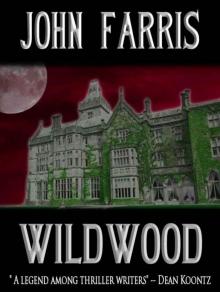 Wildwood
Wildwood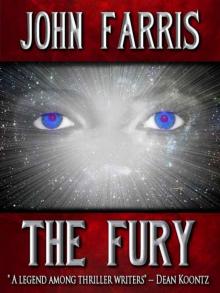 Fury
Fury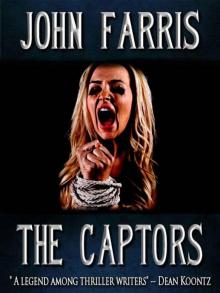 Captors
Captors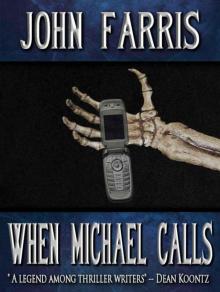 When Michael Calls
When Michael Calls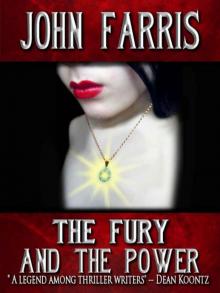 Fury and the Power
Fury and the Power Dragonfly
Dragonfly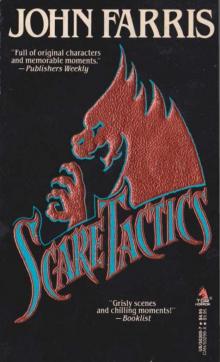 Scare Tactics
Scare Tactics